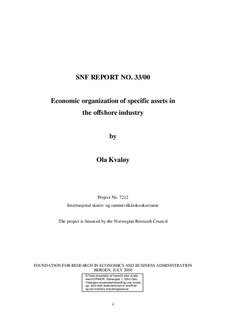| dc.contributor.author | Kvaløy, Ola | |
| dc.date.accessioned | 2006-07-06T07:20:03Z | |
| dc.date.available | 2006-07-06T07:20:03Z | |
| dc.date.issued | 2000-07 | |
| dc.identifier.isbn | 82-491-0063-8 (trykt versjon) | |
| dc.identifier.issn | 0803-4036 | |
| dc.identifier.uri | http://hdl.handle.net/11250/164693 | |
| dc.description.abstract | In the international offshore industry we find that the oil companies and their main suppliers usually enjoy separate ownership. But the main contractors manage a capital stock, and produce inputs, that are highly specific to the oil companies. Thus, within the traditional theory of the firm this organizational solution emerges as a puzzle. Asset specificity is usually considered as an argument for ownership integration. The idea is that integration reduces the problem of opportunistic behavior. In this article I show that asset specificity actually can be an argument for outsourcing. While an integrated supplier consider the asset specificity as irrelevant for his strategic behavior, disintegrated parties will find that a high degree of specificity makes opportunistic behavior less profitable than if the assets enjoyed a low degree of specificity. This outsourcing argument does only prevail in the case of physical capital. In the case of human capital, the ownership structure will not affect the profits of opportunistic behavior. | en |
| dc.format.extent | 101048 bytes | |
| dc.format.mimetype | application/pdf | |
| dc.language.iso | eng | en |
| dc.publisher | SNF | en |
| dc.relation.ispartofseries | Report | en |
| dc.relation.ispartofseries | 2000:33 | en |
| dc.title | Economic organization of specific assets in the offshore industry | en |
| dc.type | Research report | en |
